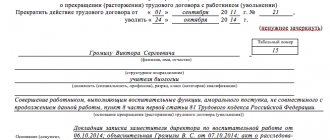ST 322.1 of the Criminal Code of the Russian Federation.
1. Organization of illegal entry into the Russian Federation of foreign citizens or stateless persons, their illegal stay in the Russian Federation or illegal transit passage through the territory of the Russian Federation -
shall be punishable by imprisonment for a term of up to five years, with or without restriction of freedom for a term of up to two years.
2. The same acts committed:
a) by a group of persons by prior conspiracy or an organized group;
b) for the purpose of committing a crime on the territory of the Russian Federation;
c) by a person using his official position, -
shall be punishable by imprisonment for a term of up to seven years with or without a fine in the amount of up to five hundred thousand rubles or in the amount of the wages or other income of the convicted person for a period of up to three years and with or without restriction of freedom for a term of up to two years.
Commentary to Art. 322.1 of the Criminal Code
1. The objective side is the organization of illegal external migration (resettlement), i.e. any activity as a result of which the possibility is created or carried out illegally: a) entry into the Russian Federation of foreign citizens and stateless persons; b) their stay in the country or c) passage through the territory of the Russian Federation. This may include planning the above-mentioned acts, selecting and training accomplices, finding documents, hiring transport, directing the actual commission of a crime.
2. The conclusion about the legality or illegality of the actions for which organizational activities are carried out must be based on the norms and institutions of public law regulating the entry and stay of foreign citizens and stateless persons in Russia.
3. Organizational activities can be aimed at ensuring the entry into Russia of migrants in violation of the statutory obligation to receive and fill out a migration card, without a visa, identity documents, with the presentation of fake documents, stay in Russia in violation of the established registration procedure, movement, after expiration length of stay, etc.
4. The moment of completion of the crime is determined differently. It is sometimes argued that it is necessary to establish the fact of illegal entry or stay in Russia or illegal transit passage.
Objective part
The direct object of encroachment is the procedure for crossing the state border established in the country's regulations. The objective side of the crime under Art. 322 of the Criminal Code of the Russian Federation formulate actions consisting of direct crossing of a boundary:
- Without valid documents allowing entry/exit.
- Without permission obtained in the manner prescribed by law.
Second commentary to Art. 322.1 of the Criminal Code of the Russian Federation
1. The objective side of this crime includes three alternative actions:
1) organization of illegal entry into the Russian Federation;
2) organization of illegal stay on the territory of the Russian Federation;
3) organization of illegal transit passage through the territory of the Russian Federation.
All of the above actions are performed against foreign citizens or stateless persons. The content of signs of illegal entry into the territory of the Russian Federation, stay in the Russian Federation and transit passage through the territory of the Russian Federation is determined by the norms of regulatory legislation.
2. The organization of illegal migration refers to the actions of various persons (both individuals and officials) that make it possible (or significantly facilitate) the crossing of the State Border of the Russian Federation or the stay on the territory of the Russian Federation of foreign citizens or stateless persons without proper permission. The scale of the activity, its success or duration, and the degree of coordination of the activities are not significant. The elements of this crime include any actions through which conditions are created for the migration of foreign citizens and stateless persons in violation of the order established by the authorities. The crime is complete from the moment any of these actions are committed.
3. The subjective side of the crime is characterized by direct intent.
4. The subject of the crime is a person who has reached the age of sixteen.
5. Qualifying signs of organizing illegal migration are provided for in Part 2 of Art. 322.1 CC:
a) commission of a crime by an organized group;
b) for the purpose of committing a crime on the territory of the Russian Federation.
Qualifying compositions
For crossing the state border of Russia when entering the territory of the country by a foreign citizen or a stateless person, if he is obviously not allowed to do so on the grounds established by law, the following types of punishment are provided:
- Up to 300 thousand rubles fine
- Deprivation of liberty.
- Forced labor.
The duration of the last two sanctions under Art. 322 of the Criminal Code of the Russian Federation – up to 4 years. The crimes provided for in parts one and two, which are committed by an organized group or by prior conspiracy, as well as using violence or under the threat of using it, are punishable by six years in prison.
Documentation
When prosecuting crimes falling under Art. 322 of the Criminal Code of the Russian Federation, judicial practice is guided by a number of provisions. In particular, the documents used for entry/exit are:
- For Russian citizens - diplomatic, internal, service passport or seaman's certificate.
- For foreigners and stateless subjects - documents by which they can be identified, and in certain cases - a visa, which is issued by the relevant diplomatic mission or consular office outside of Russia.
- For transit passengers (foreigners and stateless persons) - a transport visa, permission to enter neighboring countries or destination states, as well as valid documents for exiting the territory of Russia.
Fictitious registration of a foreigner or stateless person
This act forms a separate offense from the above and is covered by Art. 322.3. Fictitious registration of foreigners or stateless subjects at the place of their stay in residential premises on the territory of Russia is punishable by:
- 3 years of forced labor.
- Imprisonment up to 3 years.
- A fine of 100-500 thousand rubles. or equal to the salary/income of the culprit for 3 years.
In addition to the first two penalties, the court has the right to prohibit the subject from engaging in any specific activity or holding a specific position for 3 years. Commentary Art. 322.3 of the Criminal Code of the Russian Federation defines registration as fictitious registration when providing knowingly false (inaccurate) documents or information, as well as in the absence of the intention of those registered to reside (stay) in residential premises or to provide them with the receiving party. A subject may be released from liability under this article if he contributed to the disclosure of this crime, and his actions do not reveal signs of a different composition.
Additionally
For direct crossing of the state border, liability is established in Art. 322 of the Criminal Code of the Russian Federation. Illegal organization of migration has been introduced into a separate norm. Persons committing such a crime are not considered as accomplices or accomplices. Their liability is qualified under Art. 322.1 of the Criminal Code of the Russian Federation. Limiting the crime makes it possible to prevent the activities of criminal communities that ensure the illegal movement of subjects across the state border on a commercial basis. The likelihood of criminal liability tightens control over the activities of the border service. The established differentiation has become especially relevant in the context of an aggravated migration crisis.
Subjective part
The perpetrator may be an individual (sane) who has reached 16 years of age. The subjective part of the crime is guilt in the form of direct intent. In the disposition of part two there is an indication of knowledge. It means that the perpetrator knew in advance that his actions were illegal. This explains the characteristic of the subjective side. The culprit can be either a Russian citizen or a foreigner or an individual who does not have citizenship.
Features of the pass
The basis for allowing the movement of goods, persons, vehicles, animals and goods across the state border are the corresponding valid documents. Entry to checkpoints, as well as exit and import/export of objects is carried out in special places using passes. They are issued by the administration of airfields, airports, railway and bus stations, stations, and other transport enterprises after agreement with border troops and authorities. Entry/exit of Russian citizens is carried out using documents confirming their identity outside the country. The procedure in accordance with which they are issued and withdrawn is established in Federal Law No. 114. Foreign persons and those without citizenship must present valid documents that prove their identity, as well as a visa, upon entry and exit, unless otherwise provided in an international agreement.
Aggravating circumstances
They are formulated in part three of the article under consideration. In particular, liability is increased for the acts provided for in Part 1 and Part 2 if they are committed:
- An organized group or entities in a preliminary conspiracy.
- Using violent actions or threatening to use them.
The definition of the concept of a group of persons in a preliminary conspiracy, as well as an organized criminal community, is disclosed in Art. 35 of the Code. Violent actions when crossing the state border should be considered a method that involves maximum moderate harm to health. If, during the commission of a crime, intentional harm is caused to the physical condition of the victim, the act is additionally qualified under Art. 111 of the Code. Threats can come in different forms. Their character is always associated with physical violence. This category includes, among other things, death threats. In this composition, the health of an individual (usually employees who control the procedure for crossing the Russian state border) acts as an additional object.
Art. 322: note
The place where it was committed is a mandatory feature of the objective part of the assault. This is the state border of the Russian Federation. The State Border is a line and a vertical surface running along it, defining the boundaries of the country’s territory (airspace, subsoil, waters, land). In other words, this is the spatial limit up to which the sovereignty of the state operates (or from which it begins to operate). Crossing of the state border by persons and vehicles on land is carried out on international road and rail routes or in other places established in accordance with agreements between Russia and other countries or government decisions. The corpus delicti under Art. 322 of the Criminal Code of the Russian Federation is considered formal. The act is considered completed from the moment the perpetrator crosses the state border (regardless of the direction).
Exceptions
The legislation provides for a number of circumstances that are not covered by the article in question. In particular, actions committed during:
- Accident.
- A natural disaster or accident that threatens the safety of a foreign ship (including an aircraft), a foreign military ship, or another government facility used for non-commercial purposes.
- In severe storms, icy conditions or drifting ice.
- Towing a damaged foreign vessel, including a military vessel used for non-commercial purposes.
- Delivery of rescued people.
- Providing medical assistance to passengers or crew members.
- Other emergency circumstances.





